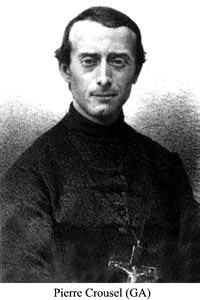Born in Poperinge, diocese of Bruges, Belgium, December 14, 1828
Ordination to Priesthood in Bruges , December 17, 1853
Taking of the habit in N.-D. de l’Osier, February 16 1856
Oblation in Dublin, February 17, 1857 (No.433)
Died in Colombo, Ceylon, December 14, 1861.
Even during his years in the diocesan seminary of Bruges Pierre Ferdinand Crousel felt an urge to serve in the missions. He remained among the secular clergy so that he could help his mother and sick sister. After their deaths, when he was assistant parish priest in Zwevezele, the young priest wondered whether the time had not arrived when he should enter a missionary congregation in order to work for a people whose need for the message of Christ was more pressing than it was among his own countrymen. It was with the express intention to depart for the missions that he entered the Oblates. Even before the end of his novitiate the Founder sent him in 1857 to Inchicore, Ireland, to help the Fathers who were building a centre from which priests were sent to preach parish missions. Crousel wrote repeatedly to Bishop de Maze-nod that the desire to serve the foreign missions did not cease. The Founder tended to acquiesce, but he had to argue with the provincial, Father Robert Cooke, who insisted he had need of Crousel. In fact, he was primarily used to collect money to finance the construction of a retreat house. On August 21, 1859, Crousel explained his desire and motivation to Father Tempier and insisted that his desire for the mission had existed unfulfilled for twelve years. After first being tested, his insistence finally succeeded. In July 1860, he received his obedience for Ceylon. Without even tarrying to visit his family in Belgium, he left, via Notre-Dame de Lumières, for Marseilles where he boarded ship on August 28.
On November 14, 1860, he could inform Bishop de Mazenod, from Chilaw, that he had finally reached Bishop Semeria and told him how moved he was by the fervency of the Christians to whom he preached missions. Using their own means and labour the believers had built a church and the missionaries heard confession for hours on end. It also appears from his letter that he foresaw the difficulty that would accompany conversion from Buddhism. During the missions that were preached under the leadership of Bishop Semeria in Chilaw and Bolawatta, he began to study Tamil. In order to perfect his knowledge of the language, he was posted to Trincomalee where, at the same time, he could help Father Keating in his pastoral work among the Irish soldiers who were part of the British legion quartered there.
He fell ill shortly after his arrival in Trincomalee. When a liver condition complicated the dysentery at the end of October 1861, he had to be taken to Jaffna. He was advised to return to Europe; but he never got further than Colombo. Even the best doctors in the capital were helpless before the illness that depleted him. He died in the parish house of Saint John, Mutwal, where he received loving care for two weeks. He was exactly 33 years old when he died. He was buried there. A few days before his death he wrote in full confidence to Bishop Semeria, that his state of health did not disturb him: “All that happens is for God’s glory”. Earlier than he could have been able to foresee, he fulfilled the feelings that he had expressed to Bishop de Mazenod when he received his obedience for Ceylon: “How happy I am. I have nothing more to ask the Lord on this earth but to die amidst the unbelievers working for their salvation”.
Father Crousel was simplicity itself. He had a gently and jovial character and he was the complete opposite of a difficult person. Yet he could he persevering. Caught in the vice of a desire to serve the kingdom of God among non-believers, he never abandoned this calling.
He was the first Oblate of Belgian nationality, who went to Ceylon.
Robrecht Boudens, o.m.i.

